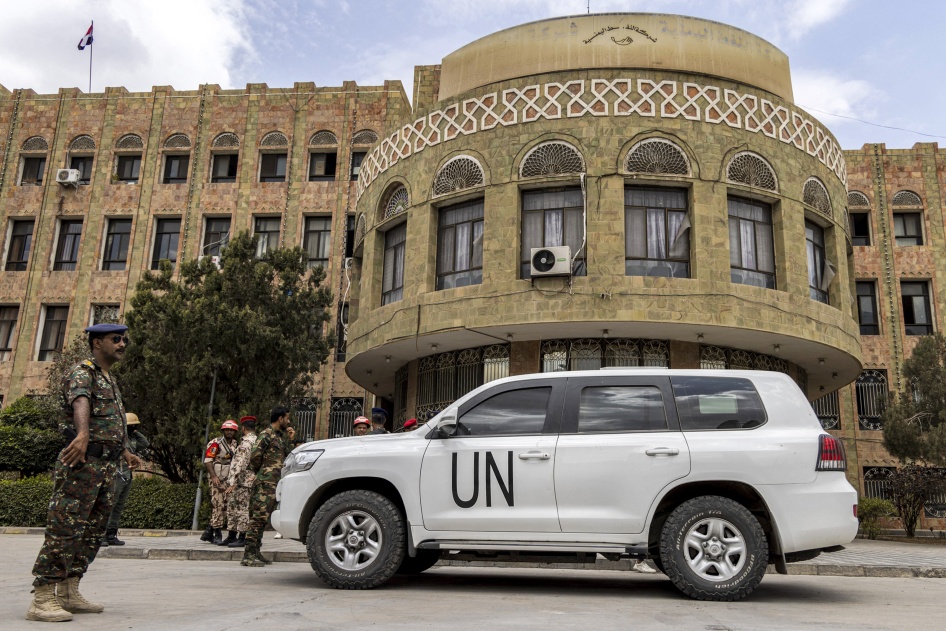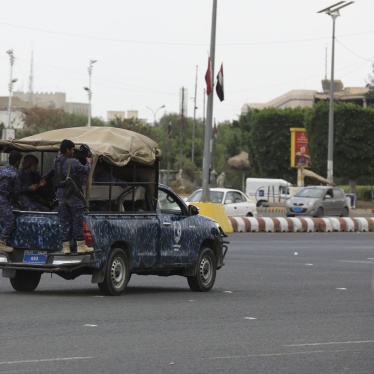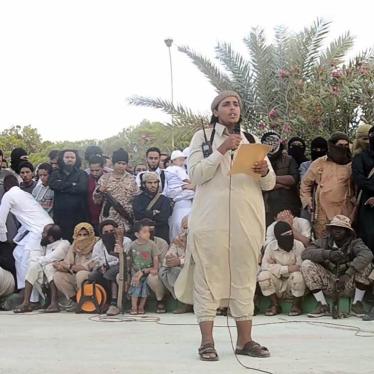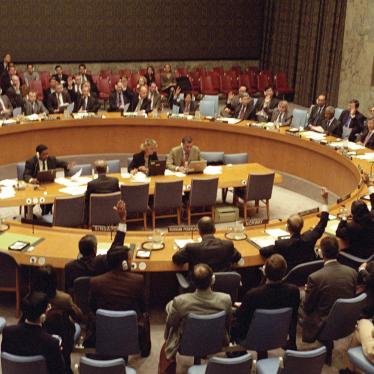(Beirut) – The Houthi authorities in Yemen have since mid-October submitted at least 12 individuals’ cases, including former United States embassy and United Nations staff, to their Specialized Criminal Prosecution, accusing some of them with crimes that carry the death penalty while denying them due process, Human Rights Watch said today. Houthi authorities have arbitrarily detained and forcibly disappeared dozens of UN and civil society staff since May 31, with informed sources telling Human Rights Watch that the number of those detained has continued to grow.
Starting on June 10, Houthi authorities released a series of videos and curated social media posts that show 10 Yemeni men, some of whom are now in the group of 12 men being investigated, confessing to spying for the United States and Israel. There is a high risk that these confessions were coerced. Human Rights Watch has previously documented the Houthis’ use of torture to obtain confessions, and three high-profile detainees have died in detention over the past year. Publishing videos of confessions undermines the right to a fair trial and lacks credibility.
“The Houthis have consistently shown a contempt for due process and basic protections for defendants since they took over Sanaa, Yemen’s capital, and this has only grown in the last few months,” said Niku Jafarnia, Yemen and Bahrain researcher at Human Rights Watch. “Recent deaths in Houthi detention should alarm the international community and prompt immediate action to ensure that the hundreds of other people being arbitrarily detained by the Houthis don’t meet a similar end.”
Human Rights Watch spoke to three people, including two UN officials, with knowledge of the criminal cases. The 12 people are being investigated by the Houthi Specialized Criminal Prosecution. They include former employees of the US embassy in Yemen and UN staff arrested between 2021 and 2023, many of whom had been held incommunicado throughout their detention, with no access to their families, and had been forcibly disappeared.
In mid-October, the men’s cases were transferred from the Houthis’ investigations unit to the prosecution unit. According to one UN official, some have undergone questioning and interrogation as part of the transfer without a lawyer present. Another UN official told Human Rights Watch that the some of the individuals were not provided with any access to lawyers throughout their detention. Though the Houthis have told at least some detainees’ families that they can appoint a lawyer for their family member, a lawyer with knowledge of the cases stated that even in some cases where the families had done so, the Houthis had still not allowed the lawyers to be present at their interrogations.
Human Rights Watch reviewed documents in which some families of detainees had demanded that the Specialized Criminal Prosecution allow them to visit their detained relatives. Despite written directives from the prosecution to the Houthi Security and Intelligence Service, the authority that oversees detention facilities, requesting they facilitate these visits, families and lawyers of these detainees have still not been granted access to detainees.
Those who have died in Houthi detention since the fall of 2023 include Mohammed Khamash, Sabri Hakimi, and Hisham al-Hakimi. Khamash and Hakimi were both senior Education Ministry officials, while al-Hakimi was an employee of Save the Children. On October 22, the Houthis contacted Khamash’s family, telling them to pick up his body. The cause of his death is unknown. Khamash had been arbitrarily detained and forcibly disappeared since June, with no access to his family or to lawyers.
The Houthis have repeatedly arrested people who have been critical of their policies based on dubious charges. In January 2024, they arrested a judge on charges related to alcohol consumption, releasing him after six months in detention without trial. In 2021, a Houthi court sentenced a Yemeni model and actress, Intisar al-Hammadi, as well as three other women, to prison after convicting them on charges of committing “an indecent act.”
Over the last year, the Houthi courts have also more frequently sentenced people to death, including in an unfair mass trial in January in which a Houthi court sentenced 32 men to prison and 9 to death on dubious charges. Human Rights Watch opposes the death penalty in all countries and under all circumstances. Capital punishment is unique in its cruelty and finality, and its determination is often plagued with arbitrariness, prejudice, and error, Human Rights Watch said.
Mohammed al-Shuwaiter, a Yemeni lawyer and the executive director of Qanun, a human rights platform, wrote on October 16 about recent changes the Houthis had made to their court system, stating that some of the changes to the court “constitute[e] a direct infringement of judicial independence and ope[n] the door wider for the use of the judicial branch – especially the criminal courts – to settle political scores, suppress dissidents, and seize property through sham trials.”
There has been a significant increase in the Houthis’ use of arbitrary detentions, enforced disappearance, and handing down of death sentences over the last several months.
In the arrests of UN and civil society officials in recent months, Houthi forces did not present search or arrest warrants at the time of arrest, and the authorities have refused to tell families where those arrested are being held, meaning that these acts amount to enforced disappearances. The Houthis have held many of the detainees incommunicado, without access to lawyers or their families.
On June 19, Human Rights Watch wrote to the Houthis with questions regarding the arrests and concerns about the apparent absence of any due process. The Houthis did not respond.
Human Rights Watch has previously documented systematic abuses in Houthi prisons. In a 2023 report, the UN Security Council’s Panel of Experts on Yemen found that “Houthi-held prisoners are subjected to systematic psychological and physical torture, including the denial of medical intervention to cure the injuries caused by the torture inflicted, which for some prisoners resulted in permanent disabilities and death.”
“These cases demonstrate the serious risks that the dozens, if not hundreds, of people who remain in arbitrary detention face in Houthi-controlled prisons,” Jafarnia said. “The Houthis should immediately end their use of arbitrary detention and enforced disappearance, and improve prison conditions, and states with influence should act to ensure that no more people die in Houthi detention.”








